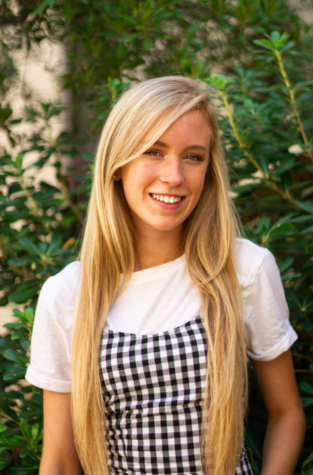
“I never hid my faith from anybody, and this led to me being questioned time and time again about it.”
The first thing I hear on Sunday morning is gospel music blaring in the kitchen. My sister and I are greeted with our parents singing and dancing and the smell of eggs, biscuits, rice, potatoes and bacon cooking. I spend the morning getting ready: fixing my hair, doing my makeup and finding an outfit. I then race downstairs to grab breakfast before running into the car, plate in one hand, shoes in the other.
My dad and mom are singing along with gospel music as my sister and I pretend to know the words and sing in the backseat. When I walk into church, I look around, picking out my favorite church hats and outfits, giggling at the women jumping and singing their hearts out with the huge choir.
As the pastor delivers his sermon, my sister and I fight over Trident Juicy Fruit gum, which we only get on Sundays. Our parents give us “the look” as we quickly pay attention to our pastor. After service is over, we sit in the car and talk about what we took from the sermon.
• • •
Church and my faith has always been a huge part of my life. My grandfather was a pastor, and my dad grew up in the church and benefited from it greatly, so he wanted us to have a Christian upbringing. I never hid my faith from anybody, and this led to me being questioned time and time again about it.
I’m a strongly opinionated liberal, and everybody who is around me knows this. I don’t hesitate to give my opinions on social justice issues. I wear bright tie dye shirts that say things like “Pizza rolls not gender roles” and proudly wear my Beto and Obama shirts. Politics have always fascinated me and I’m proud of having strong views. It’s a part of my identity. However, people always asked me how I could be liberal and a Christian or if I was “one of those judgemental Christians.”
I’ve always known there are Christians who believe in and do bad things. Some people use their faith to justify their judgemental and hateful attitudes and opinions which is against what the liberal platform stands for. Unfortunately, that became the new model for Christianity. This caused me to question my faith. It felt like two parts of my identity were playing a game of tug of war within me.
However, my doubts subsided after a conversation with my mother. She reminded me of what I always knew. The core of Christianity is love. There are always going to be bad people, but we can’t make judgements based on them. People that use their faith to spout hate and judgement aren’t really following Christianity.
Remembering this gave me peace of mind; however, I still struggled with the comments about me being a liberal and a Christian. The platform for liberals is presented as a party for the people. They are supposed to help everyone, no matter their race, religion, gender, sexuality, age or socioeconomic status. This is similar to the message of Christians — to love and help all. These go hand in hand, yet many liberals treat it like the exact opposite.
There is a tremendous amount of hypocrisy within the liberal platform. They look down on Christians, claiming they are judgemental, but in reality they are the ones judging.
Society tends to focus on the worst, but that’s just human nature. If someone sees a perfectly straight line of crayons and one is bent, they will only look at the bent one. Of course, the worst people are typically the loudest and most prominent, but fair judgements can’t be made without seeing all sides. There are about 100 different sides to everything, making overarching decisions after only looking at one side is ridiculous and ignorant.
Within every group of people, there are extremists. If we view them as the representatives for their groups, we will have a society where people constantly attack each other. Focusing on extremists will cloud our judgement and lead society down a future path of war. In order to prevent such events, we need to look past extremists and stereotypes and stop making judgments about one another.









